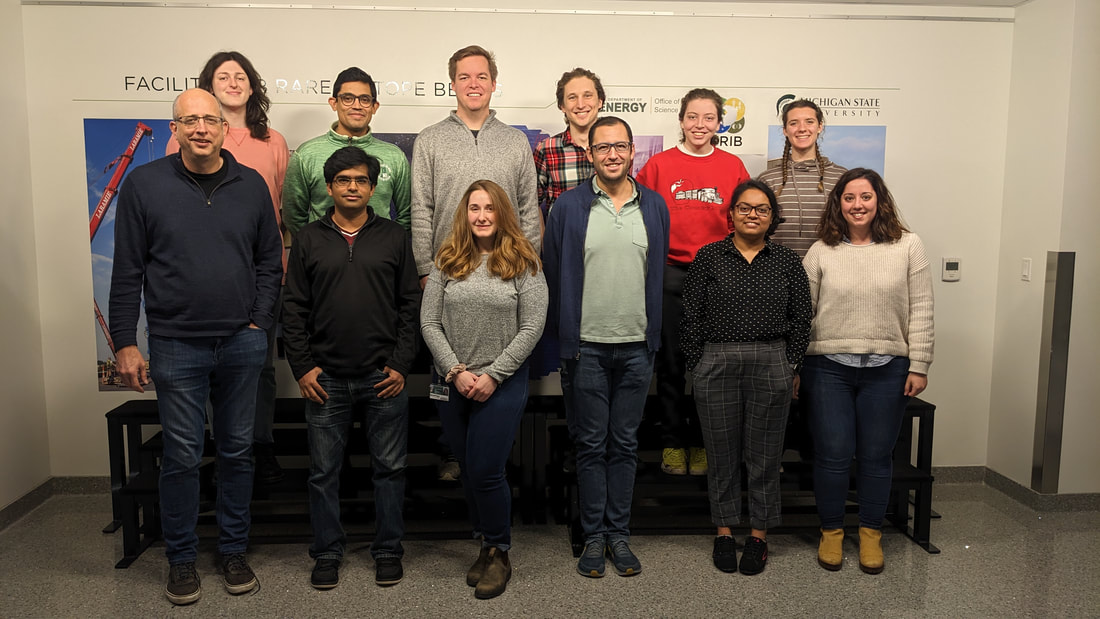About. |
Our group carries out rare isotope beam experiments that restage nuclear processes in extreme astrophysical environments such as X-ray bursts, Nova explosions, Supernovae, or deep inside Neutron Stars. The goal is to understand the origin of the elements and find out what observations can tell us about matter in extreme astrophysical sites. We use a variety of experimental devices at NSCL and are currently building the SECAR recoil separator. Our group combines experimental work with astrophysical simulations to guide experiments and to interpret results.
|
We are closely integrated into the Joint Institute for Nuclear Astrophysics Center for the Evolution of the Elements (JINA-CEE) and the international IReNA. networks that offer unique opportunities for young scientists to network across subfields with experimentalists at other laboratories around the world, nuclear theorists, computational astrophysicists, and astronomical observers. Opportunities include attendance of international workshops, conferences, and interdisciplinary schools; career development activities; research stays at other institutions around the world; organization the annual collaboration meeting; networking with leading scientists codes; access to data, equipment, and codes; and much more.
|
Opportunities. |
We are looking for PhD Students for start in Summer or Fall 2022
PhD Thesis Projects: Experimental thesis projects (typically with some theory or computational astrophysics component) are available in the following areas: (these can be either supervised by Hendrik Schatz or by Fernando Montes).
We are committed to provide an inclusive, equitable, and supportive environment where every student and postdoc can be successful. Success is defined as achieving individual long term career goals, be it in academia, education, medicine, industry, or other sectors. We follow and enforce the FRIB code of conduct and JINA-CEE code of conduct.
PhD Thesis Projects: Experimental thesis projects (typically with some theory or computational astrophysics component) are available in the following areas: (these can be either supervised by Hendrik Schatz or by Fernando Montes).
- SECAR experiments related to X-ray bursts, element synthesis in supernova explosion
- Decay studies of exotic isotopes related to the origin of the heavy elements made in the r-process.
- Studies of unstable exotic nuclei that are thought to make up the crust of neutron stars
- We are happy to discuss other options and ideas, including more theoretical or computationally oriented projects typically done in collaboration with faculty in the FRIB theory group, the astronomy group in the Dept. of Physics and Astronomy, and the Computational Math Science and Engineering Department.
- Apply to the graduate program at the MSU Department of Physics and Astronomy - choose EXPERIMENTAL nuclear physics as your interest, even if you are interested in theory or combined theory/experiment in our group.
- Contact us by sending a short e-mail - either Hendrik Schatz or Fernando Montes. We are happy to answer any questions, either by e-mail, or by setting up a Zoom call. We can also arrange contact with current graduate students.
We are committed to provide an inclusive, equitable, and supportive environment where every student and postdoc can be successful. Success is defined as achieving individual long term career goals, be it in academia, education, medicine, industry, or other sectors. We follow and enforce the FRIB code of conduct and JINA-CEE code of conduct.
Group. |
Zum Bearbeiten hier klicken.
Contact. |


